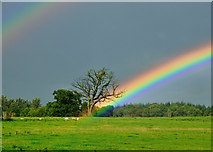Frequently, I hear congregants complain that their rabbis are not inspiring or that they never take clear stands on issues of importance. That’s why the ongoing discussion about rabbinic independence that has erupted again at B’nai Jeshurun, covered very fairly by The Jewish Week (“B’nai Jeshurun Defections Fuel Debate,” Feb. 28), transcends any single congregation and any one subject. It is a contemporary case study about two issues facing the congregational world:
- the intersection of a rabbi’s obligation to speak his or her mind truthfully and the members of a congregation’s right to feel that their voices are also heard and,
- the ability to maintain a community in which individuals have shared depth of passion about an issue, while holding divergent views on tactics.
That is why respectful coverage of issues like these are important and healthy, because they test the ability of congregations to not become monolithic echo chambers, where two factions shout at one another and victory goes to the most shrill side. We can’t let synagogues go down that path.
A primary role of the rabbi is to build community infused with purpose. If a rabbi’s goal is only to create relationships and build community, I actually don’t understand what that means: relationships and community toward what end? Yes—we desperately need places like congregations that can be microcosms of kindness, civility, decency and meaningful, multi-generational interaction. But even more, we need communities to help us be and do more than we can alone. Purposeful, intentional communities that transform the lives of individuals and positively impact the broader community develop over time with the help of rabbis who are possessed with a vision of a grander tomorrow. If good and warm and nice are your essential goals, then you can expect rabbis who will be sweet but relatively bland, lest they offend someone. Congregations will have spiritual caretakers but not spiritual leaders. Rabbi Israel Salanter, founder of the Musar Movement, expressed this idea best when he said, “A rabbi whose community does not disagree with him is no rabbi. A rabbi who fears his community is no man.”
However, rabbi and senior volunteer leaders need to reach agreement first about the vision they strive to fulfill together. The operative word in this sentence is “together. ” Neither rabbi nor congregational leaders unilaterally declare the vision. Rather, rabbis and senior volunteer leaders develop a shared vision. In that process, a rabbi has considerable opportunity to bring an integrated understanding and approach of the “what” and “why” of being Jewish. Then, over a period of years, rabbi and senior volunteers work together on achieving just a little bit more perfection in their corner of the world—their congregational community. This is not a linear process and it’s messy and open at times. But when rabbis and volunteers learn how to keep their eyes on the ball over a long time horizon, they create a kind of alchemy that can turn moral blight into moral majesty.
Rabbis can’t be expected to separate their “political beliefs” from their Jewish values either. The idea of partitioning personal beliefs from public persona is authentically Protestant but antithetically Jewish. Politics are intertwined with policy and the allocation of resources that touch deeply on Jewish values, so rabbis are authentic when they refract these issues through their reading of the Jewish tradition. But a rabbi must also be sensitive to where the congregation is at a given moment in time, assess how far he or she can try to move it and also know when the congregation must pause to gain strength for the next step, be it inward or outward. Especially in our trigger-finger social-media environment, rabbis owe their leaders advanced notice of how they intend to address controversial issues, but should not be censured for doing so.
Ultimately, when rabbis and volunteer leaders can’t agree upon a shared vision, it’s time to examine the sustainability of the relationship. But remember: when rabbis and volunteers have worked hard together over a long period, the option for parting ways should be treated like radical surgery—the only possible last resort that might save a life. And even if that life is saved, it is never the same again. That’s why where there is a commitment to a shared vision and transparent communications, and a rabbi speaks from the heart about that vision but congregational leaders buckle under pressure, they have failed their rabbi and their community. That results not just in the loss of good rabbis but also in the loss of communities of purpose—communities that have the ability to change lives and change worlds.
And now to the current challenge. In full disclosure, Rabbi Matalon and I were close classmates in rabbinical school. I’m grateful that we’ve maintained our friendship over the years and, not surprisingly, the last time we met together in person was at a café in Yerushalayim. My respect for him and for his colleagues has grown over the years and his love for Israel doesn’t need my verbal defense. His work on Israel advocacy within his congregation and beyond speaks for itself. But I am compelled to speak out for two reasons. First, I believe that it’s still possible for individuals with shared values but disparate strategies to remain friends and be in dialogue. Second, because as I wrote earlier, the Jewish community deserves rabbis who speak about issues that are not theoretical, but ultimate and real.
The hatred toward Israel in parts of Europe has been gathering steam for years and similar feelings have already seeped into influential institutions here. The policies of the current Israeli government often offend my Jewish sense of justice, just as my colleagues on the right do when they seek to justify that which is plainly and morally wrong. But, given a globally networked effort to undermine the legal legitimacy of a Jewish state (forces which the current Israeli government often feeds), I won’t be silent when my rabbinic colleagues publicly blast Jewish organizations that advocate for Israel, even when I don’t agree with all of their tactics. Why? Because I know from personal experience that my words will be used as precious gifts to organizations and individuals who have dedicated their lives to the denial of Israel’s existence.
While I am appalled by right-wing national and religious extremism, I will find other ways than expressing my views in public pronouncements that have the potential to strengthen those who are irreconcilably hostile to the existence of a Jewish state. While I respect those who disagree with me, I’m casting my choice with the first century Jewish sage, Shimon ben Shetach, who said: “be deliberate in your choice of words, lest others abuse them to testify falsely (Pirkei Avot 1:9).”




